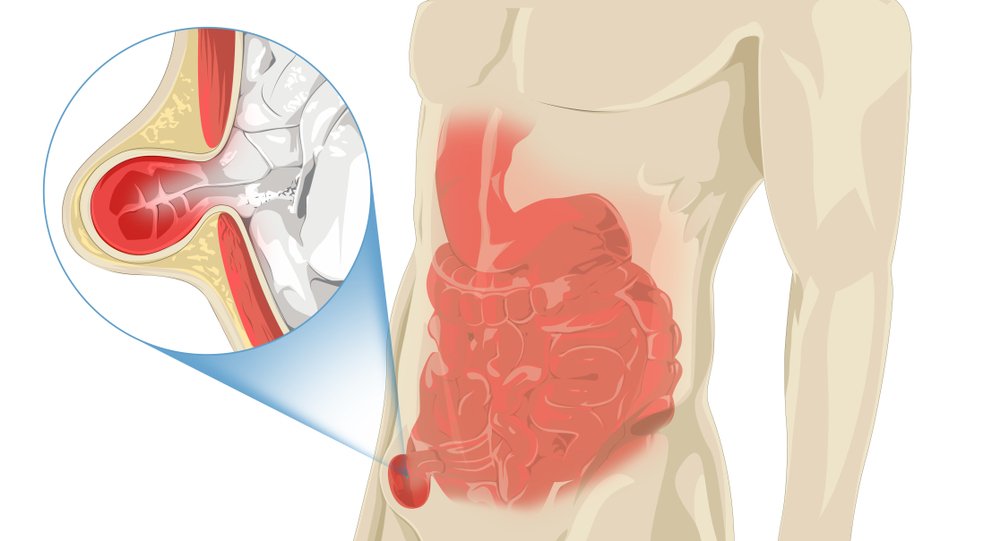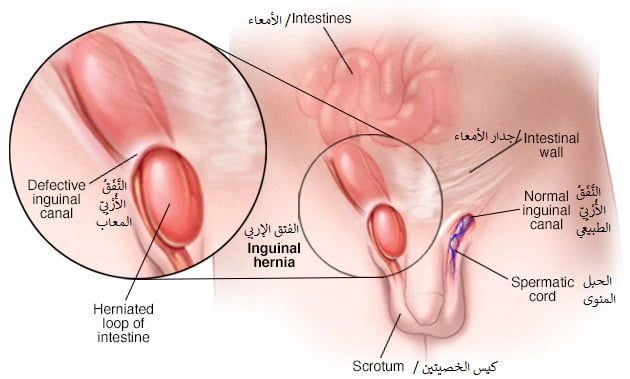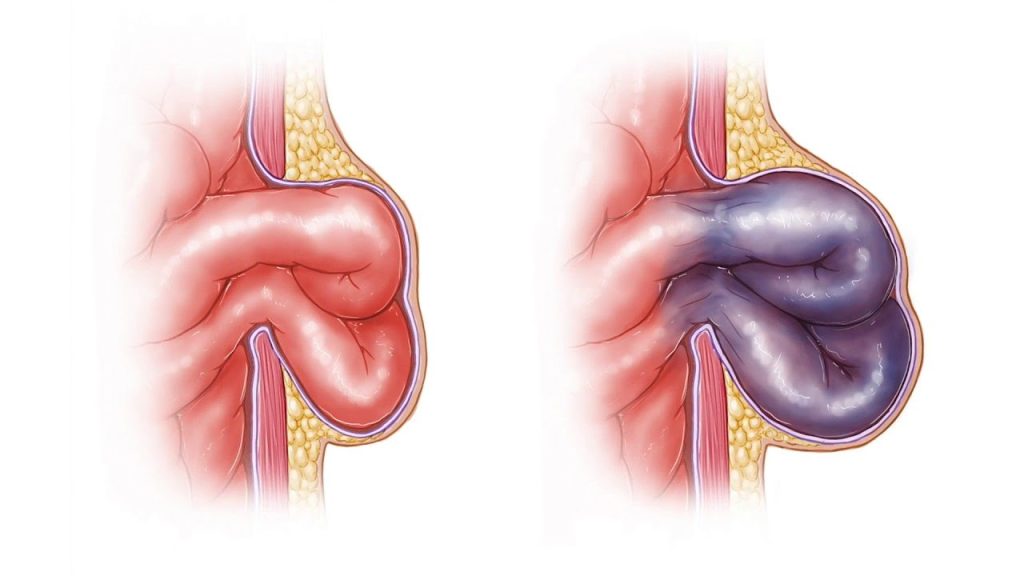Inguinal hernia operation in Türkiye
An inguinal hernia is a protrusion of the contents of a cavity or ring of the small intestine of the abdomen into the inguinal canal. Inguinal hernia occurs when tissue, such as part of the intestine, protrudes through a weak point in the abdominal muscles. Or a tear in the peritoneum (the serous membrane lining the abdominal cavity), which leads to a bulge. Hernia treatment is among the most frequently performed surgeries in the world.

Development of an inguinal hernia:

Inguinal hernias arise at any age from infancy to adulthood due to weakness in the abdominal muscles. It is more common in males, with a risk of 27% in men and 3% in women. Or it occurs as a result of excessive pressure on the abdominal wall due to heavy lifting, weight gain, or coughing. or difficult bowel movements and urination.
- In men: The weak point usually occurs in the inguinal canal, where the spermatic cord enters the scrotum.
- In women: The inguinal canal carries a ligament that helps hold the uterus in place. Hernias occur where the connective tissue from the uterus connects to the tissues surrounding the pubic bone.
Contributing factors for inguinal hernia:
Factors that contribute to an inguinal hernia include:
- Gender: Men are eight times more likely to have an inguinal hernia than women.
- Pregnancy: Pregnancy can weaken the abdominal muscles and cause increased pressure there.
- Premature birth and low birth weight.
- Aging: Muscles weaken with age.
- Chronic constipation: Constipation causes straining during defecation.
- Race: Whites are more likely to develop a hernia than others.
- Chronic cough.
- smoking.
- heredity.
Symptoms of inguinal hernia
- Swelling on both sides of the pubic bone (both sides of the thigh) and appears especially in the standing position. or coughing or straining.
- A feeling of pain in the bulging area.
- Pain and discomfort in the thigh, especially when bending over. or coughing or lifting.
- A feeling of heaviness in the thigh.
- Thigh weakness or pressure.
- Pain and swelling around the testicles when the protruding bowel descends into the scrotum.
Complications of inguinal hernia:
Complications include:
- Pressure on surrounding tissues: Inguinal hernias swell when they are not surgically healed, causing them to extend into the scrotum in men, causing pain and swelling.
- Trapped hernia: It is the confinement of the contents of the hernia in the weak point in the abdominal wall, which leads to severe pain, nausea, vomiting, and the inability to defecate or pass gas.
- Strangulation: An incarcerated hernia may result when it cuts off the blood flow to a part of the intestine, which may lead to the death of the affected intestinal tissue. A strangulated hernia is life-threatening and requires immediate surgery.
What is a strangulated hernia and what are its symptoms?
A strangulated hernia is a contraction of the surrounding muscles around the fatty tissue. Or part of the small intestine protruding through a weakened area of the abdominal muscle, cutting off the blood supply to the small intestine and causing a number of severe symptoms. It is a life-threatening medical condition whose symptoms include:

- Sudden sharp pain that increases steadily.
- bloody stools and constipation.
- Darkening or redness of the skin over the hernia.
- Fatigue and a birthmark.
- Gas retention.
- Inflammation and pain around the hernia.
- Increased heart rate.
- Nausea and vomiting.
Inguinal hernia treatment
Open surgery:
The patient is given local anesthesia in the abdomen or spine. Or general anesthesia, or a combination of the two, and then the surgeon makes an incision in the groin, returns the hernia to the abdomen, and strengthens the muscle wall with sutures through synthetic mesh to provide additional support.
Laparoscopic inguinal hernia repair:
General anesthesia is used. The surgeon makes several small incisions in the lower abdomen and inserts a laparoscope (a thin tube equipped with a small video camera), which gives the surgeon a close-up view of the hernia and surrounding tissues. The surgeon uses surgical tools to carefully repair the hernia using synthetic mesh to provide additional support.
Possible complications
Surgery to repair an inguinal hernia is generally safe, and complications are uncommon, but they include:
- risk of general anesthesia.
- Hernia recurrence.
- bleeding.
- wound infection.
- scar formation.
- Injury to internal organs.
Prevention of inguinal hernia:
It cannot be prevented if it results from a congenital defect, but the pressure on the abdominal muscles and tissues can be reduced through the following:
- Maintain a healthy weight: by following a healthy diet and exercising regularly.
- Eat foods rich in fiber: Fiber prevents constipation and fatigue and is found in fruits, vegetables and whole grains.
- Avoid lifting or lifting heavy objects with caution: Bend from the knees, not from the waist, when lifting something heavy.
- Stop smoking: Smoking causes a chronic cough that can lead to or aggravate an inguinal hernia.
Inguinal hernia operation in Türkiye:
The medical staff of surgical teams, doctors and consultants in REHABTÜRK can provide the best treatment options and free consultations – by striving to keep abreast of the latest medical technologies and methods.

